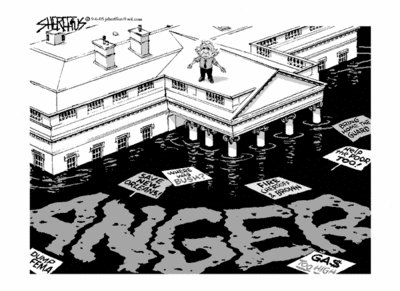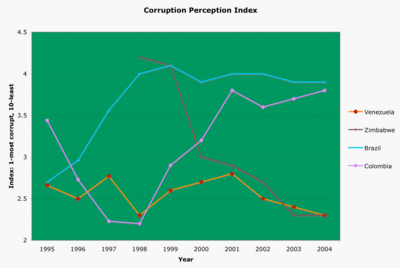To Súmate, to the opposition parties, to all those that oppose Chávez, to the ni-nis. What is wrong with you?. Can't you see the trap that is looming for the December elections?. Isn't three times enough?. Can't you see that the CNE cannot be trusted?. Are you willing to have as an only resource the international observers?, again?. You know the saying, "fool me once, it's your fault, fool me twice, it's mine." But fool me four times?. I have been wondering what can be done, but clearly walking, yet again, towards the slaughter house that is the CNE, staying at home and abstaining, or voting null is not it.
This election is it, what started with the RR will be consolidated here, after this there will be no turning back, at least not in a very long time. Some sectors inside the Chavista masses are starting to rise, but I would not trust that to exert any change, Chavez might end up buying them, suppressing them, or just ignoring them without any consequence. And who knows if this is yet another distraction technique to keep attention away from the elections themselves.
I have always noticed how a large portion of Venezuelans just want a messiah (specially you ni-nis), an opposition candidate that will give you 'hope.' Can't you see that if Chavez is not stopped, there will be no one to do this?. Can't you see that we have to create strong democratic institutions?, that is not the job of one man, that is the job of all Venezuelans. You have to force institutions to be strong, and blindly following an individual, no matter which one, is not the way to do it.
Chavistas, you have put your trust in having found that messiah, well I hope that you like the conversion of Venezuela in another Cuba, the abolition of private property, the sliding away from the civilized world, and the dilapidation of the immense oil income directly to sustain the international image of your idol. Look towards Cuba, that is your future. While you keep believing that Chavez is being fooled start thinking how can someone be so blind to what is happening around him?. How can you be so blind?
Opposition parties, I feel sorry for you, I know that many of your members feel that you don't deserve the way that Venezuelans are treating you, but that is the price you pay for being in the forefront, for making the many mistakes that your members have made. The debacle of the RR is as much your fault as it is Chávez's. Be honorable in this juncture, think what is the best for Venezuela. Create a clear message, be responsible with your message. Show the numbers, show the effect that Chavez is having, make people understand all the money that is being wasted, all the corruption taking place, and the destruction of private property, and all the consequences of staying the path. Relearn how to lead again, but more importantly, learn how to be led by the Venezuelan civil society. Some humility would do you good. If you can't do that, just move away and be forgotten.
Venezuelan civil society, Súmate, neighbor assemblies, you are the hope of Venezuela. Regain that strength that drove you towards the RR, but focus your objectives. It is clear that any protest will be heavily repressed, but you don't need to take the streets to show force. There have been many examples of the power of continuous pacific protests. Fliers, stickers, graffiti, obstruction, inaction, education. Some basic ground rules is all that is needed, follow the examples of what works and discard what doesn't. Learn that Chavistas are not the enemy, Chávez and his close cronies are. Make Chavistas, and the remaining honorable military understand that. But more importantly, act as a single unit, don't waste time on minor divisions, mold a clear objective and pursue it. Chavez's strength is in dividing the Venezuelan society, your strength is in uniting it again.
Quoting Gene Sharp (a must read for anyone willing to resist the regime):Dictatorships usually exist primarily because of the internal power distribution in the home country. The population and society are too weak to cause the dictatorship serious problems, wealth and power are concentrated in too few hands. Although dictatorships may benefit from or be somewhat weakened by international actions, their continuation is dependent primarily on internal factors.
What to do about the elections?
First, don't put all the eggs in one basket. You cannot trust the CNE to do the right thing, they have not done it so far, what will make this time special?. Build a parallel organization, there are more than enough volunteers to man it, invite some of the displaced Chavistas, a significant percentage of them don't trust the CNE, they might be willing to sidestep it as long as the effort is about the CNE, not about Chavez. A parallel election does not have to cost much, as long as it is carried away across a few days, on a few centers. Súmate has made this before, it can be done again. It is not legally binding, but Chávez owns the laws, so does it really matter?. Make it an exit election, make it a secret poll, add some relevant voluntary questions. Are you willing to give away your private property?. Is it ok to have imported 50000 cubans into Venezuela?. Do you trust the CNE?. Did the Carter Center do their job in the RR?. Make it a massive poll, make it open, make it easily verifiable, negotiate its contents with the Chavistas that are willing to participate, make people swear that they voted the same way as in the CNE, if they did at all. A simple database search would show the CNE fraud. If 1/3 of Venezuelans participate in it, it would overshadow the CNE election, and remember that you can be much more efficient. Talk to the international observers, even invite the disagreeable Carter Center to this, you might have some fun with them trying to save face.
Second, get organized. Your strength is in the numbers, make a true educational campaign, distribute the information through any means possible. Tell the people why are the institutions important, force them to think. Keep the messages short and to the point, not long winding essays (I know, I am not giving a good example here). You don't have to print a million copies of anything, just let each Venezuelan print 10, that would cover the whole country several times over, minimize the individual risks. Let the lowest level of organization, the individual, decide how to best distribute the information and minimize their risk. But make sure that the message is clear, choose a powerful symbol and a powerful message. Remember, the 'opposition' has to be that strong organization, not the personalities in it. Let the opposition parties follow your message, but not take over it. Stick to institutions, not personalities.
Third, keep yourself pure, and be open about your intentions and actions. If an opposition leader detracts from your message, point it out, attack the message not the messenger. Let the international media notice you, but don't make them the object of your campaign, Venezuelans are your main objective. Don't lower yourself to any personal attacks of any personality on one side or the other, make this a very clear difference to Chávez. Remember, it is about the institutions, attack the actions, not the actors.
Fourth, be alert. Mold the message to the circumstances. Chávez disinformation goons will try to subvert your message, make sure to point it out, but keep the style pure so that there is no confusion of where is the message coming from and don't waste your time discrediting them multiple times, or fighting about the little details, allow for intelligence to work, remember that the goons are not your objective, the general public is. Make everyone aware of what is the acceptable style, only distribute information if it follows the right style and the topic is verifiable. Create trust circles around such messages, and don't forget that it is democracy that you are seeking, be democratic about this too. Chavez will have a very hard time trying to get through this 'media'.
Would any of this work?. I don't know, though it has worked many times before. It will increase the level of society's participation and it is definitively more rewarding than just doing nothing.
- From Dictatorship to Democracy: A Conceptual Framework for Liberation by Gene Sharp
- Otpor!Working quietly, a group of student activists target the very foundation of Milosevic's power - the ordinary people who until now have been afraid to oppose him. (PBS)
- Otpor: the youths who booted Milosevic
- Otpor! Resistance!
- Kmara
- Pora! It's time!
- Human Rights Watch blasts Chávez's government, is anyone listening?
- Electoral disarray in Venezuela
- Chavismo internal problems The multiple cases of Chavistas trampled by their own party.
- The Chávez praying mantis effect is alive and well.
- Hugo sows fear by Teodoro Petkoff
- Savage Socialism by Teodoro Petkoff
- Polar does not back down Lorenzo Mendoza gave a lesson on how to stay on topic.
- Carter Baker report on elections generates anger and laughter in Caracas
- The words of a fascist president




